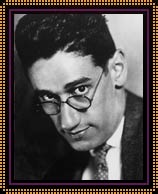 For a man who was supposed to hate music and musicals with considerable fervor, George S. Kaufman made significant contributions as a librettist and director to a variety of productions in the American musical theater from the ’20s through to the ’50s. Early in his career he worked as a newspaper columnist for several years in Washington and later in New York, where he became one of the brightest young talents in the early ’30s, many of whom, including Kaufman, Ring Lardner, Dorothy Parker, Alexander Woollcott, and Robert Benchley, were members of the Algonquin Hotel’s Round Table set. After co-writing the book with Marc Connelly in 1923 for “Helen of Troy, New York,” which had a score by Bert Kalmar and Harry Ruby, Kaufman contributed sketches or was the librettist or co-librettist on a number of other Broadway musical productions, including “Music Box Revue (Third Edition)”, “Be Yourself!”, “The Cocoanuts,” “Animal Crackers,” “The Little Show,” “Strike up the Band,” “Nine-Fifteen Revue,” and “The Band Wagon.”
For a man who was supposed to hate music and musicals with considerable fervor, George S. Kaufman made significant contributions as a librettist and director to a variety of productions in the American musical theater from the ’20s through to the ’50s. Early in his career he worked as a newspaper columnist for several years in Washington and later in New York, where he became one of the brightest young talents in the early ’30s, many of whom, including Kaufman, Ring Lardner, Dorothy Parker, Alexander Woollcott, and Robert Benchley, were members of the Algonquin Hotel’s Round Table set. After co-writing the book with Marc Connelly in 1923 for “Helen of Troy, New York,” which had a score by Bert Kalmar and Harry Ruby, Kaufman contributed sketches or was the librettist or co-librettist on a number of other Broadway musical productions, including “Music Box Revue (Third Edition)”, “Be Yourself!”, “The Cocoanuts,” “Animal Crackers,” “The Little Show,” “Strike up the Band,” “Nine-Fifteen Revue,” and “The Band Wagon.”
George S. Kaufman
- "The Cocoanuts"
"Face the Music"
"I'd Rather Be Right"
- "Let 'Em Eat Cake"
- "Of Thee I Sing"
- "Silk Stockings"
- "Sing Out the News"
- "The Band Wagon"
- George Gershwin
- Ira Gershwin
- Moss Hart
- Al Hirschfeld
- Cole Porter
- Jerome Robbins
By now an established figure, he also directed most of the subsequent productions on which he worked. In the ’30s and ’40s these included “Of Thee I Sing,” for which he won a Pulitzer, “Face the Music” (director only), “Let ‘Em Eat Cake,” “I’d Rather Be Right,” “Sing Out the News,” “Seven Lively Arts,” “Hollywood Pinafore,” and “Park Avenue” (1946). In 1950 Kaufman earned a Tony Award for his direction of the superb “Guys and Dolls,” and, five years later, collaborated with his second wife, the actress Leueen MacGrath, on the book for the Cole Porter musical “Silk Stockings.” His work in the musical theater was just a part of his wider output. He is credited with 45 plays written in conjunction with some 16 known collaborators who included Edna Furber, Ring Lardner, and his principal later collaborator Moss Hart. With Hart he wrote some of the American theater’s most enduring comedies — “Once in a Lifetime,” “You Can’t Take It With You” (for which he won his second Pulitzer Prize), and “The Man Who Came to Dinner.”
FURTHER READING:
GEORGE S. KAUFMAN: AN INTIMATE PORTRAIT, Howard Teichmann.
GEORGE S. KAUFMAN AND HIS FRIENDS, Scott Meredith.
Source: Biographical information provided by MUZE. Excerpted from the ENCYCLOPEDIA OF POPULAR MUSIC, edited by Colin Larkin. © 2004 MUZE UK Ltd.
Photo credits: Photofest

